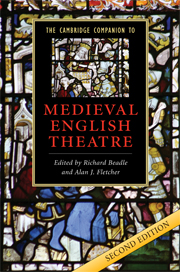Book contents
- Frontmatter
- 1 An introduction to medieval English theatre
- 2 The theatricality of medieval English plays
- 3 The cultural work of early drama
- 4 The York Corpus Christi Play
- 5 The Chester cycle
- 6 The Towneley pageants
- 7 The N-Town plays
- 8 The non-cycle plays and the East Anglian tradition
- 9 Morality plays
- 10 Saints and miracles
- 11 Modern productions of medieval English drama
- 12 A guide to criticism of medieval English theatre
- Select bibliography
- Author index to the bibliography
- General index
9 - Morality plays
Published online by Cambridge University Press: 28 November 2011
- Frontmatter
- 1 An introduction to medieval English theatre
- 2 The theatricality of medieval English plays
- 3 The cultural work of early drama
- 4 The York Corpus Christi Play
- 5 The Chester cycle
- 6 The Towneley pageants
- 7 The N-Town plays
- 8 The non-cycle plays and the East Anglian tradition
- 9 Morality plays
- 10 Saints and miracles
- 11 Modern productions of medieval English drama
- 12 A guide to criticism of medieval English theatre
- Select bibliography
- Author index to the bibliography
- General index
Summary
Traditionally only five medieval English morality plays survive: The Pride of Life (122, pp. 90–105), The Castle of Perseverance, Wisdom, Mankind (120) and Everyman (123, 124), to give them their common titles, together constitute the entire corpus of an apparently influential native dramatic genre. The identification of the genre has been retrospective, and depends largely on the perceived influence of these plays on the more abundantly surviving Tudor interlude. A working definition of a characteristic dramaturgy for the morality play can, therefore, be constructed on the basis of these few surviving texts. Their absolute cohesion as a group is a different matter, however, and is bound to be questioned in any attempt to define that form in its individual manifestations and theatrical contexts, particularly as The Pride of Life is a fragmentary Hiberno–English text and Everyman a (Tudor) translation from a Dutch original. All except Everyman survive in manuscript, all but Wisdom in one copy only, so their status and authority is also provisional, bearing imperfect witness to ephemeral theatrical events which cannot be perfectly retrieved.
What these plays have in common most obviously is that they offer their audiences moral instruction through dramatic action that is broadly allegorical. Hence they are set in no time, or outside historical time, though their lack of historical specificity is generally exploited by strategically collapsing the eternal with the contemporary. The protagonist is generally a figure of all men, reflected in his name, Everyman or Mankind, and the other characters are polarised as figures of good and evil. The action concerns alienation from God and return to God, presented as the temptation, fall and restitution of the protagonist.
- Type
- Chapter
- Information
- The Cambridge Companion to Medieval English Theatre , pp. 235 - 262Publisher: Cambridge University PressPrint publication year: 2008
- 9
- Cited by

